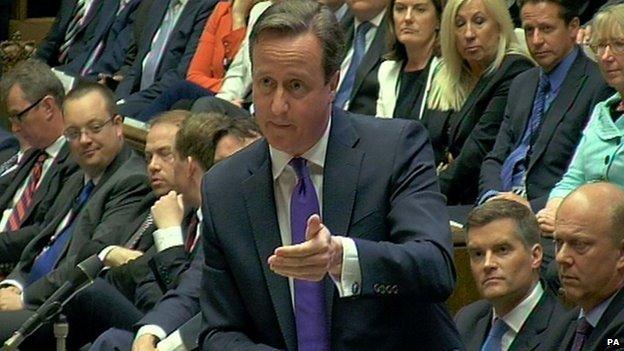Does the Queen's Speech make economic sense?
- Published
- comments

To whom is David Cameron's hand extended?
The first legislative programme of the Conservative government looks ambitious. But what does it tell us about the economic soul of David Cameron and his ministerial colleagues?
Is there a rubric or ideology that usefully describes their agenda? Or is it best seen as pragmatism designed above all to shore up Tory support in parts of England where it is weak, and a short-term prophylactic against the restiveness of nations undermining the prime minister's ability to govern?
Here are phrases offered to me by one of the writers of the Queen's Speech that are supposed to show it is a seamless and coherent reform package: "It is One Nation - helping working people, championing social justice and binding the UK together."
Hmmm.
It is certainly possible to see the proposed measures as unifying us, in all those senses. But equally there are risks attached to almost all the important initiatives, whose impact could be to drive wedges between nations and social classes.
In other words, it is a Queen's Speech of compelling paradoxes.
For example, and to state the obvious (sorry), devolution of important powers to Scotland, Wales, Northern Ireland, the English contingent of the Westminster parliament, and those cities which decide to elect powerful new mayors, could prove the high watermark of demands for national and regional self-determination.
And in that sense, they could be useful national glue.
Or they could be just another amuse-bouche for those who want to feast on the break-up of the UK - and could be another stage on the route to the secession of Scotland, whose cultural and economic impact on the rest of the UK would be profound.
Indeed, there are those who say that the union with Scotland is less important to David Cameron than the prospect of winning a few incremental votes in the North West, via plans to improve infrastructure and job prospects there through a so-called Northern Powerhouse.
Similarly, a new law to guarantee that those working a 30-hour week on the minimum wage would pay no income tax may enhance the life chances of those at the bottom and encourage them to work rather than live on benefits.
Or they could create a new underclass of the lower-paid, who largely opt out of making contributions to the welfare state, and are discouraged from seeking career enhancement to avoid the cost and hassle of paying tax.
Then there is the proposed Trade Unions Bill, which further restricts the right to strike.
Will it improve the confidence of businesses and therefore encourage them to make job creating investments?
Or will it make it easier for employers in private and public sectors to hold down wages - which would not necessarily be to the benefit of working people?
There is also a determination to cut red tape - which, again, could and should spur business investment.
But as the governor of the Bank of England has warned, a promised referendum on whether the UK should stay in the EU may deter big multinationals from investing here, pending certainty on whether Britain is in or out of Europe.
What is more, a crackdown on immigration that may restrict companies acquiring the talent they say they need may not be an investment stimulus.
So whether the UK sees higher or lower investment - and therefore higher or lower productivity- as the net consequence of these contrasting measures is unclear.
When it comes to social justice, there will be a new lower limit on the amount that households receive in benefits and greater compulsion on young people to train, rather than receive social security. Whether this is unfair punishment of the meek or justice for hardworking families depends on your politics and how directly you'll be affected.
And there is a seeming contradiction in housing policy.
The government wants to increase the supply of affordable housing. But it is creating a new right to buy social housing provided by Housing Associations, and it is obliging councils to sell off the priciest of their council houses (as and when they are vacated).
Which means that in the short term at least, there may be an even greater shortage of homes for the very poorest - even though the government will put pressure on councils and housing associations to replace all sold properties.
Meanwhile, there is big talk of improving energy security and supply. But there will be enhanced powers for people to block development of wind farms in their backyards - which is a turbine that rotates in contradictory directions, perhaps.
All in all, it is a programme with considerable economic risks attached to it. But maybe that reflects the uncertainties of our age, rather than an uncertain hand on the tiller.